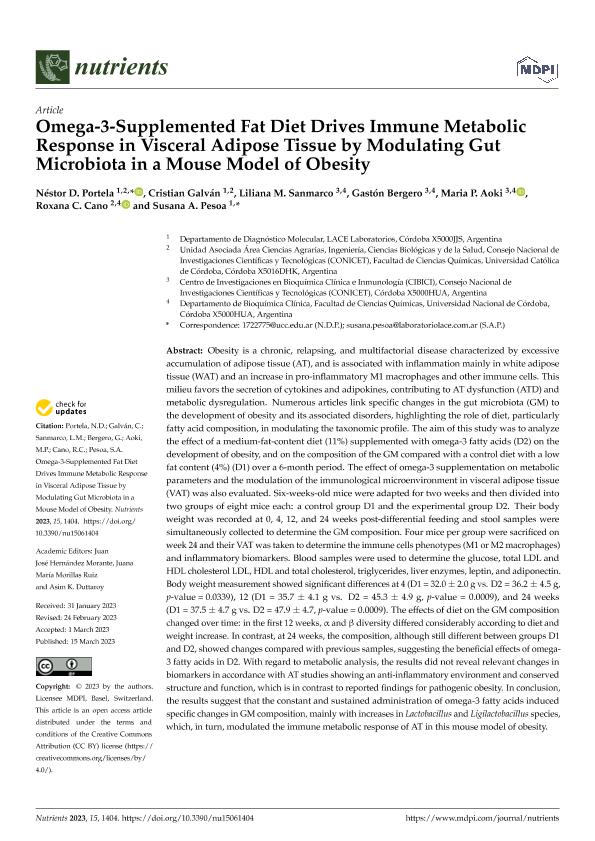Artículo
Omega-3-Supplemented Fat Diet Drives Immune Metabolic Response in Visceral Adipose Tissue by Modulating Gut Microbiota in a Mouse Model of Obesity
Portela, Néstor Denis; Galván, Cristian; Sanmarco, Liliana Maria ; Bergero, Gastón
; Bergero, Gastón ; Aoki, Maria del Pilar
; Aoki, Maria del Pilar ; Cano, Roxana Carolina; Pesoa, Susana A.
; Cano, Roxana Carolina; Pesoa, Susana A.
 ; Bergero, Gastón
; Bergero, Gastón ; Aoki, Maria del Pilar
; Aoki, Maria del Pilar ; Cano, Roxana Carolina; Pesoa, Susana A.
; Cano, Roxana Carolina; Pesoa, Susana A.
Fecha de publicación:
03/2023
Editorial:
Multidisciplinary Digital Publishing Institute
Revista:
Nutrients
e-ISSN:
2072-6643
Idioma:
Inglés
Tipo de recurso:
Artículo publicado
Clasificación temática:
Resumen
Obesity is a chronic, relapsing, and multifactorial disease characterized by excessive accumulation of adipose tissue (AT), and is associated with inflammation mainly in white adipose tissue (WAT) and an increase in pro-inflammatory M1 macrophages and other immune cells. This milieu favors the secretion of cytokines and adipokines, contributing to AT dysfunction (ATD) and metabolic dysregulation. Numerous articles link specific changes in the gut microbiota (GM) to the development of obesity and its associated disorders, highlighting the role of diet, particularly fatty acid composition, in modulating the taxonomic profile. The aim of this study was to analyze the effect of a medium-fat-content diet (11%) supplemented with omega-3 fatty acids (D2) on the development of obesity, and on the composition of the GM compared with a control diet with a low fat content (4%) (D1) over a 6-month period. The effect of omega-3 supplementation on metabolic parameters and the modulation of the immunological microenvironment in visceral adipose tissue (VAT) was also evaluated. Six-weeks-old mice were adapted for two weeks and then divided into two groups of eight mice each: a control group D1 and the experimental group D2. Their body weight was recorded at 0, 4, 12, and 24 weeks post-differential feeding and stool samples were simultaneously collected to determine the GM composition. Four mice per group were sacrificed on week 24 and their VAT was taken to determine the immune cells phenotypes (M1 or M2 macrophages) and inflammatory biomarkers. Blood samples were used to determine the glucose, total LDL and HDL cholesterol LDL, HDL and total cholesterol, triglycerides, liver enzymes, leptin, and adiponectin. Body weight measurement showed significant differences at 4 (D1 = 32.0 ± 2.0 g vs. D2 = 36.2 ± 4.5 g, p-value = 0.0339), 12 (D1 = 35.7 ± 4.1 g vs. D2 = 45.3 ± 4.9 g, p-value = 0.0009), and 24 weeks (D1 = 37.5 ± 4.7 g vs. D2 = 47.9 ± 4.7, p-value = 0.0009). The effects of diet on the GM composition changed over time: in the first 12 weeks, α and β diversity differed considerably according to diet and weight increase. In contrast, at 24 weeks, the composition, although still different between groups D1 and D2, showed changes compared with previous samples, suggesting the beneficial effects of omega-3 fatty acids in D2. With regard to metabolic analysis, the results did not reveal relevant changes in biomarkers in accordance with AT studies showing an anti-inflammatory environment and conserved structure and function, which is in contrast to reported findings for pathogenic obesity. In conclusion, the results suggest that the constant and sustained administration of omega-3 fatty acids induced specific changes in GM composition, mainly with increases in Lactobacillus and Ligilactobacillus species, which, in turn, modulated the immune metabolic response of AT in this mouse model of obesity.
Archivos asociados
Licencia
Identificadores
Colecciones
Articulos(CIBICI)
Articulos de CENTRO DE INV.EN BIOQUI.CLINICA E INMUNOLOGIA
Articulos de CENTRO DE INV.EN BIOQUI.CLINICA E INMUNOLOGIA
Citación
Portela, Néstor Denis; Galván, Cristian; Sanmarco, Liliana Maria; Bergero, Gastón; Aoki, Maria del Pilar; et al.; Omega-3-Supplemented Fat Diet Drives Immune Metabolic Response in Visceral Adipose Tissue by Modulating Gut Microbiota in a Mouse Model of Obesity; Multidisciplinary Digital Publishing Institute; Nutrients; 15; 6; 3-2023; 1-27
Compartir
Altmétricas



